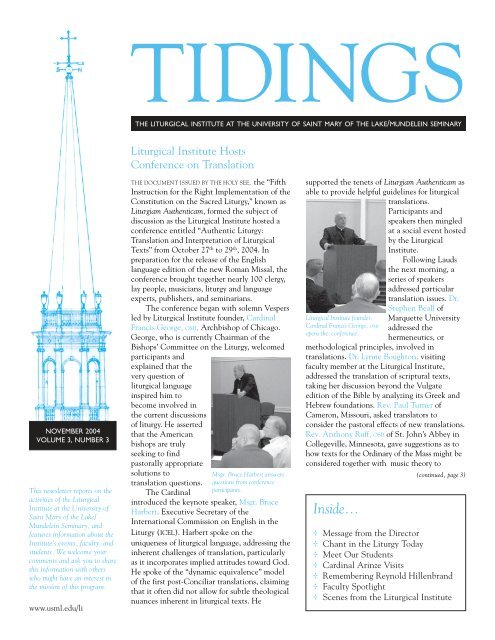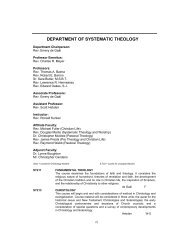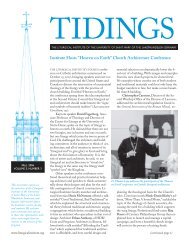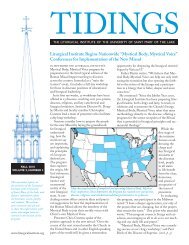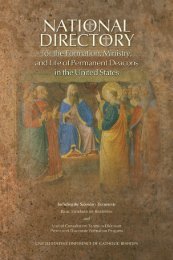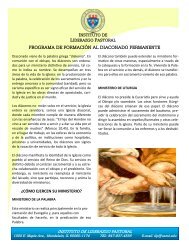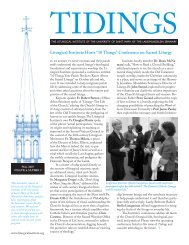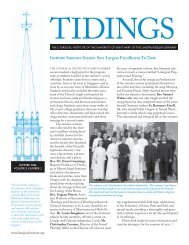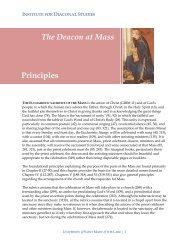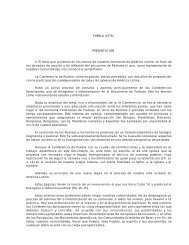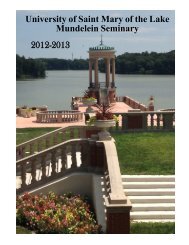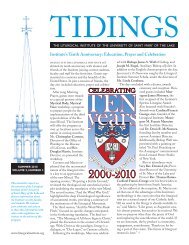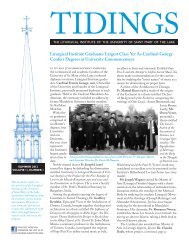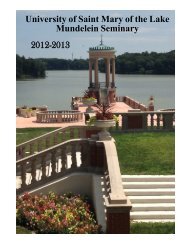Volume Three, Number 3, Fall 2004 - Mundelein Seminary
Volume Three, Number 3, Fall 2004 - Mundelein Seminary
Volume Three, Number 3, Fall 2004 - Mundelein Seminary
Create successful ePaper yourself
Turn your PDF publications into a flip-book with our unique Google optimized e-Paper software.
TIDINGS<br />
THE LITURGICAL INSTITUTE AT THE UNIVERSITY OF SAINT MARY OF THE LAKE/MUNDELEIN SEMINARY<br />
Liturgical Institute Hosts<br />
Conference on Translation<br />
NOVEMBER <strong>2004</strong><br />
VOLUME 3, NUMBER 3<br />
This newsletter reports on the<br />
activities of the Liturgical<br />
Institute at the University of<br />
Saint Mary of the Lake/<br />
<strong>Mundelein</strong> <strong>Seminary</strong>, and<br />
features information about the<br />
Institute’s events, faculty, and<br />
students. We welcome your<br />
comments and ask you to share<br />
this information with others<br />
who might have an interest in<br />
the mission of this program.<br />
www.usml.edu/li<br />
THE DOCUMENT ISSUED BY THE HOLY SEE, the “Fifth<br />
Instruction for the Right Implementation of the<br />
Constitution on the Sacred Liturgy,” known as<br />
Liturgiam Authenticam, formed the subject of<br />
discussion as the Liturgical Institute hosted a<br />
conference entitled “Authentic Liturgy:<br />
Translation and Interpretation of Liturgical<br />
Texts” from October 27 th to 29 th , <strong>2004</strong>. In<br />
preparation for the release of the English<br />
language edition of the new Roman Missal, the<br />
conference brought together nearly 100 clergy,<br />
lay people, musicians, liturgy and language<br />
experts, publishers, and seminarians.<br />
The conference began with solemn Vespers<br />
led by Liturgical Institute founder, Cardinal<br />
Francis George, OMI, Archbishop of Chicago.<br />
George, who is currently Chairman of the<br />
Bishops’ Committee on the Liturgy, welcomed<br />
participants and<br />
explained that the<br />
very question of<br />
liturgical language<br />
inspired him to<br />
become involved in<br />
the current discussions<br />
of liturgy. He asserted<br />
that the American<br />
bishops are truly<br />
seeking to find<br />
pastorally appropriate<br />
solutions to<br />
translation questions.<br />
The Cardinal<br />
Msgr. Bruce Harbert answers<br />
questions from conference<br />
participants.<br />
introduced the keynote speaker, Msgr. Bruce<br />
Harbert, Executive Secretary of the<br />
International Commission on English in the<br />
Liturgy (ICEL). Harbert spoke on the<br />
uniqueness of liturgical language, addressing the<br />
inherent challenges of translation, particularly<br />
as it incorporates implied attitudes toward God.<br />
He spoke of the “dynamic equivalence” model<br />
of the first post-Conciliar translations, claiming<br />
that it often did not allow for subtle theological<br />
nuances inherent in liturgical texts. He<br />
supported the tenets of Liturgiam Authenticam as<br />
able to provide helpful guidelines for liturgical<br />
translations.<br />
Participants and<br />
speakers then mingled<br />
at a social event hosted<br />
by the Liturgical<br />
Institute.<br />
Following Lauds<br />
the next morning, a<br />
series of speakers<br />
addressed particular<br />
translation issues. Dr.<br />
Liturgical Institute founder,<br />
Cardinal Francis George, OMI<br />
opens the conference.<br />
Stephen Beall of<br />
Marquette University<br />
addressed the<br />
hermeneutics, or<br />
methodological principles, involved in<br />
translations. Dr. Lynne Boughton, visiting<br />
faculty member at the Liturgical Institute,<br />
addressed the translation of scriptural texts,<br />
taking her discussion beyond the Vulgate<br />
edition of the Bible by analyzing its Greek and<br />
Hebrew foundations. Rev. Paul Turner of<br />
Cameron, Missouri, asked translators to<br />
consider the pastoral effects of new translations.<br />
Rev. Anthony Ruff, OSB of St. John’s Abbey in<br />
Collegeville, Minnesota, gave suggestions as to<br />
how texts for the Ordinary of the Mass might be<br />
considered together with music theory to<br />
Inside...<br />
(continued, page 3)<br />
Message from the Director<br />
Chant in the Liturgy Today<br />
Meet Our Students<br />
Cardinal Arinze Visits<br />
Remembering Reynold Hillenbrand<br />
Faculty Spotlight<br />
Scenes from the Liturgical Institute
Fr. Douglas Martis, a priest of<br />
the Diocese of Joliet-in-Illinois,<br />
holds an S.T.D. with a<br />
concentration in Sacramental<br />
Theology from the Institut<br />
Catholique de Paris and a<br />
Ph.D. in History of Religions<br />
and Religious Anthropology<br />
from the University of Paris<br />
(La Sorbonne).<br />
From the Director<br />
WOW! THIS IS PERHAPS THE BEST WORD to describe<br />
the activity of the Liturgical Institute these past<br />
few months. Academics, conferences, new<br />
books, special projects: each of these aspects of<br />
the Institute’s apostolate has enjoyed a flurry of<br />
activity. In September we were blessed by the<br />
presence of Francis Cardinal Arinze, a strong<br />
supporter of our Institute, who celebrated the<br />
Sacred Liturgy and spent an evening with our<br />
students. In October, George Cardinal Pell,<br />
Archbishop of Sydney, visited our campus and<br />
expressed his interest in our program.<br />
People frequently ask about the Institute.<br />
Like the two disciples on the road in Luke 24, I<br />
want to announce the amazing things that have<br />
gone on here. In 1956, Dom Bernard Botte,<br />
writing about his Institut Supérieur de Liturgie,<br />
underscored its mission of preparing professors<br />
so that the riches of the Catholic liturgical<br />
tradition could be passed on and revealed to a<br />
new generation; he called on bishops and<br />
religious superiors to send students. Within the<br />
first few years, his graduates found themselves<br />
contributing to the Aggiornomento of Pope John<br />
XXIII. In a similar way, our Institute finds itself at<br />
an important time in the Church today as it<br />
prepares competent leaders for the future.<br />
The Holy See’s interest in liturgical<br />
questions is met by the growing desire of clergy<br />
and faithful for authenticity and stability in<br />
liturgical expression. This convergence of<br />
interests shows the importance of preparing<br />
leaders for “a new era in liturgical renewal.” The<br />
Institute’s curriculum explores the theology of<br />
the rites, emphasizes sacramental principles,<br />
and subscribes to the conviction that pastoral<br />
decisions must be rooted in good sacramental<br />
theology. The course of studies is coupled with<br />
the daily celebration of the Mass and of<br />
singing the Divine Office so that liturgical<br />
theory and praxis will augment and nourish<br />
each other. One recent graduate remarked,<br />
“the daily liturgies helped me to see the<br />
theology and history we were studying in class<br />
become incarnate in our celebrations.” The<br />
Liturgical Institute forms leaders and scholars<br />
who bring this depth of understanding to<br />
dioceses and parishes. But our task does not<br />
end there. In the past few months, our<br />
publishing house, Hillenbrand Books, has<br />
released five texts that treat various liturgical<br />
and sacramental topics, providing resources for<br />
pastors, teachers, students, and directors of<br />
liturgy. Our fall conferences were well<br />
attended and provided a forum for participants<br />
from around the world to discuss various<br />
liturgical topics with an eye to opening the<br />
treasures of the Church’s prayer.<br />
The Liturgical Institute has put together a<br />
comprehensive program, assembled an<br />
impressive faculty and is blessed with an<br />
energetic, dedicated, and creative staff who are<br />
committed to the continuing renewal of the<br />
liturgy. I wish to express my gratitude to them<br />
and to all of you who support the Institute by<br />
your participation and your prayers. <br />
UPCOMING EVENTS AT THE LITURGICAL INSTITUTE<br />
February 16-18, 2005 “Teaching Today’s Seminarians”<br />
Sacramental Theology and Liturgical Formation<br />
A conference for seminary professors of liturgy and sacramental theology addressing contemporary concerns. Keynote<br />
address by Fr. John Canary, Rector of <strong>Mundelein</strong> <strong>Seminary</strong>, “Profile of Today’s Seminarian.” Other topics include the<br />
“new faithful” generation, a bishop’s perspective on sacramental preparation, teaching liturgical practica, sacramental<br />
theology and pedagogy, pastors and newly ordained.<br />
March 9, 2005 Hillenbrand Distinguished Lecture Series: Prof. Duncan Stroik<br />
Duncan Stroik, a practicing architect and Associate Professor of Architecture at the University of Notre Dame,<br />
addresses the importance of tradition in Catholic liturgical architecture. Free and open to the public; please call for a<br />
reservation, 847.837.4542.<br />
April 20-22, 2005 “The Lost Language of Vatican II”<br />
Cosmic and Heavenly Dimensions of the Sacred Liturgy<br />
A conference addressing the language of the Council documents which emphasize continuity with received liturgical<br />
tradition, particularly in relation to the transcendent nature of liturgy. Topics include the “Roots of Sacrosanctum<br />
Concilium in Mediator Dei,” “Liturgical Song and the Music of Heaven,” “The Mass as Heaven on Earth,”<br />
“Who Celebrates?The Heavenly Assembly,” and “Church Architecture as Icon of the Heavenly Jerusalem.”<br />
Speakers include Aidan Nichols, OP, Edward Oakes, SJ, Robert Reilly and others.<br />
For more information call 847.837.4542 or visit www.usml.edu/li and click “conferences.”
Institute faculty member Monsignor Roy<br />
Klister leads the prayers at the grave of<br />
Monsignor Reynold Hillenbrand (above),<br />
and a panel offers their remembrances<br />
(below).<br />
Liturgical Institute Remembers<br />
Monsignor Reynold Hillenbrand<br />
THE LIFE AND LEGACY OF MONSIGNOR REYNOLD<br />
Hillenbrand (1904-1979) was explored in a<br />
memorial and colloquium sponsored by the<br />
Liturgical Institute on July 19 th , <strong>2004</strong>, the<br />
centennial of Hillenbrand’s birth. Hillenbrand,<br />
priest of the Archdiocese of Chicago and<br />
Rector of <strong>Mundelein</strong> <strong>Seminary</strong> from 1936 to<br />
1944, was a noted pioneer in the liturgical<br />
movement and a tireless champion of social<br />
reform.<br />
The event, which attracted nearly 75<br />
participants, began with a graveside memorial<br />
service in the cemetery of the University of<br />
Saint Mary of the Lake/<strong>Mundelein</strong> <strong>Seminary</strong>.<br />
The rite used for visiting a cemetery was prayed,<br />
lead by Institute faculty member Msgr. Roy<br />
Klister, assisted by Liturgical Institute students<br />
and faculty who made up a small schola to lead<br />
the singing of hymns and litany of the saints.<br />
Mr. Delmar Mitchell, who was a child when he<br />
met Hillenbrand, offered a short summary of<br />
Hillenbrand’s life and achievements. Many<br />
members of Msgr. Hillenbrand’s family were<br />
in attendance, including one sister and<br />
several nieces and nephews, and many<br />
lingered after the ceremony to place flowers<br />
at Hillenbrand’s grave.<br />
After a luncheon offered by the Liturgical<br />
Institute, a panel colloquium was held,<br />
moderated by Deacon Michael McNulty of<br />
Sacred Heart Parish in Winnetka, Illinois,<br />
where Hillenbrand spent decades as pastor after<br />
retiring from the seminary.<br />
The panel was composed of Fathers Victor<br />
Ivers, Tom Conley, and Dan Sullivan, all priests<br />
of the Archdiocese of Chicago who worked<br />
closely with Hillenbrand and studied under him<br />
at <strong>Mundelein</strong> <strong>Seminary</strong>. Calling themselves<br />
“Hillenbrand men,” the three recounted stories<br />
of Hillenbrand’s captivating charisma, his<br />
dedication to the liturgical reform and social<br />
justice, and his work with the Catholic Family<br />
Movement.<br />
Hillenbrand was remembered as a man<br />
“always in his black cassock” who saw the Mass<br />
and social justice as inseparable, arguing that<br />
without an understanding of the importance of<br />
social justice, “it would be impossible to<br />
understand the liturgy.” Others spoke of<br />
Hillenbrand’s appointment as rector of<br />
<strong>Mundelein</strong> <strong>Seminary</strong> at the age of 31, also<br />
remembering Hillenbrand’s insistence on the<br />
use of Gregorian chant in the liturgy.<br />
Considered by panelists a man ahead of his<br />
time, they recalled Hillenbrand’s study of the<br />
writings of liturgical reformers Prosper<br />
Guéranger, Odo Casel, and Lambert Beauduin.<br />
All commented on Hillenbrand’s rhetorical<br />
ability, remarking that people would listen to<br />
Hillenbrand speak “with tears in their eyes.”<br />
More than anything, Hillenbrand was<br />
remembered as a great man of the Church, loyal<br />
to the Holy Father and working to renew the<br />
Church’s life through liturgy and social reform.<br />
Requiescat in pace. <br />
Please help!<br />
The Liturgical Institute is forming<br />
a scholarship fund for the many<br />
needy students who desire to study<br />
the Church’s liturgy. Please send<br />
your tax-deductible contribution<br />
to:<br />
Liturgical Institute Scholarships<br />
1000 East Maple Avenue<br />
<strong>Mundelein</strong>, Illinois 60060<br />
May God bless your generosity.<br />
Translation Conference, continued<br />
produce singable texts with theologicallyappropriate<br />
musical settings.<br />
After a break for Mass and dinner, attendees<br />
were treated to an etymological exploration with<br />
scripture scholar and philologue Rev. Robert<br />
Schoenstene of <strong>Mundelein</strong> <strong>Seminary</strong>.<br />
Schoenstene took a scholarly but lighthearted<br />
look at the origins of the words “authentic” and<br />
“liturgy,” bringing them from their Latin, Greek,<br />
Indo-European and occasionally Sanskrit origins<br />
and manifestations.<br />
The final morning brought Lauds followed<br />
by a presentation on the term sacramentum and<br />
its change through history by Dr. Daniel Van<br />
Slyke of Ave Maria College in Ypsilanti,<br />
Michigan. The conference concluded with a<br />
lecture from Dr. Dennis McManus, Associate<br />
Director of the Secretariat for the Liturgy of<br />
the Bishops’ Committee on the Liturgy.<br />
McManus spoke of the translation theory<br />
inherent in Liturgiam Authenticam, addressing<br />
its distinct differences from the 1969<br />
guidelines used to<br />
translate the current<br />
Missal. He fielded a<br />
series of enthusiastic<br />
questions before the<br />
conference adjourned.<br />
Reactions to the<br />
conference were<br />
overwhelmingly<br />
positive. Attendees<br />
praised the “beautiful<br />
liturgies,” the<br />
“excellent content of<br />
the lectures,” and the<br />
“social events which<br />
allowed participants<br />
Dr. Dennis McManus speaks on<br />
translation theory in Liturgiam<br />
Authenticam.<br />
to meet informally with the speakers.” One<br />
respondent summed the Institute’s hopes in<br />
planning the conference by calling it<br />
“affordable, effective and valuable to me and my<br />
work in the diocese.”
Meet Our<br />
Students<br />
More student profiles to come<br />
in future issues<br />
Fr. Bill McCumber, B.A.,<br />
Philosophy and Theology, St.<br />
Louis University; M. Div,<br />
Kenrick <strong>Seminary</strong>, St. Louis. A<br />
priest of the Archdiocese of St.<br />
Louis, Fr. McCumber has held<br />
the position of Director of the<br />
Office of Sacred Worship since<br />
2001. He has served in parish<br />
ministry for nearly twenty years, most recently as<br />
pastor of Mary, Queen of the Universe parish in St.<br />
Louis. A member of the diocesan curia, he has also<br />
served as a consultant to diocesan committees and<br />
prepared liturgical workshops. He hopes to<br />
concentrate his studies at the Institute on liturgical<br />
art and architecture.<br />
Fr. Celestine Byekwaso,<br />
Dip. Th., St. Thomas<br />
Aquinas <strong>Seminary</strong>, Nairobi;<br />
S.T.L., Spirituality and<br />
Ecclesiology, St. Patrick’s<br />
University, Dublin. As a<br />
priest of the Diocese of<br />
Kasana-Luweero, Uganda, Fr.<br />
Celestine brings a wealth of<br />
experience to his studies, having served as a<br />
pastor, seminary rector, cathedral rector, and<br />
diocesan liturgist. He came for further study to<br />
become “updated on the Church’s teaching in<br />
liturgy and learn its practical aspects.” He plans<br />
to focus his research on the meaning of “active<br />
participation.”<br />
Fr. Tony Bico, B.A.,<br />
Sociology, Seton Hall<br />
University; S.T.B., Pontifical<br />
Gregorian University, Rome;<br />
S.T.L., Spirituality, Pontifical<br />
Institute Teresianum. A native<br />
of Portugal and a priest of the<br />
Archdiocese of Newark, Fr.<br />
Tony is the first student in the<br />
Liturgical Institute’s new initiated doctoral<br />
program. He brings years of parish, prison, and<br />
drug rehabilitation ministry experience, and upon<br />
completion of his degree expects to teach at the<br />
Immaculate Conception <strong>Seminary</strong> of Seton Hall<br />
University.<br />
Fr. Cosmas Aina, S.T.B., St.<br />
Augustine <strong>Seminary</strong>, Jos,<br />
Nigeria. Fr. Cosmas comes to<br />
the Institute from the Diocese<br />
of Ilorin, Nigeria, where he has<br />
served for 10 years in parish<br />
ministry. He spent 4 years as<br />
Rector of the Cathedral of<br />
Saint Joseph in Ilorin, and also<br />
has served as his diocese’s Coordinator for Health.<br />
Fr. Cosmas was sent for studies by his bishop with<br />
the hope that upon his return, he would found and<br />
direct a diocesan office for liturgy.<br />
Fr. Tien Tran, B.A.,<br />
Philosophy, Christ the King<br />
<strong>Seminary</strong>, Mission, British<br />
Columbia; M. Div., St. Peter’s<br />
<strong>Seminary</strong>, London, Ontario.<br />
After four years as episcopal<br />
Master of Ceremonies and 6<br />
years as a pastor, Fr. Tien, a<br />
priest of the Archdiocese of<br />
Vancouver, is pursuing a degree in liturgy in order to<br />
return to support his diocesan liturgical commission<br />
work. He sees the Institute as a “wonderful place”<br />
where student learn “according to the mind of the<br />
Church.”<br />
Fr. Martin Azhikkakath,<br />
B. Ph. and B.Th., St. Joseph<br />
Interdiocesan <strong>Seminary</strong>,<br />
Mangalore, India. Fr. Martin is a<br />
priest from the Diocese of<br />
Verapoly, India, currently<br />
serving in the Archdiocese of<br />
Chicago at St. John Vianney<br />
Parish in North Lake, Illinois.<br />
Before coming to Chicago, he served as Secretary to<br />
his archbishop, for whom he was also Master of<br />
Ceremonies. He hopes to use his knowledge from the<br />
Liturgical Institute to better celebrate the Eucharist.<br />
Would you like to be<br />
among the leaders of<br />
the “new era in<br />
liturgical renewal”?<br />
Write for further information:<br />
The Liturgical Institute<br />
University of Saint Mary<br />
of the Lake/<strong>Mundelein</strong> <strong>Seminary</strong><br />
1000 East Maple Avenue<br />
<strong>Mundelein</strong>, Illinois 60060<br />
847.837.4542<br />
or see our web site at:<br />
www.usml.edu/li<br />
Faculty Spotlight: Fr. Emery de Gaál<br />
The Liturgical Institute is very pleased to welcome Fr. Emery De Gáal to its<br />
faculty. He comes to us with studies at the University of Munich and a<br />
doctorate from Duquesne University in Pittsburgh. In Munich he studied<br />
under famed theologians Joachim Gnilka, Leo Cardinal Scheffczyk, and<br />
Gerhard Müller. A native Chicagoan of Hungarian parents, he spent many of<br />
his childhood years in Germany. He is a priest of the Diocese of Eichstätt,<br />
near Munich, and the author of The Art of Equanimity: A Study on the<br />
Theological Hermeneutics of Saint Anselm of Canterbury. In addition to teaching<br />
“Principles of Sacramental Theology” for the Liturgical Institute, he also<br />
teaches ancient and medieval philosophy as well as Mariology in <strong>Mundelein</strong> <strong>Seminary</strong> where he has<br />
found a great following among students for his gentle manner and scholarly depth. He describes the<br />
students he has taught so far as “serious, studious, and willing to make sacrifices in order to minister<br />
to the People of God.”
Liturgical Institute Hosts<br />
Conference on Chant<br />
MORE THAN ONE HUNDRED PARTICIPANTS interested in<br />
the role of chant in post-conciliar liturgy met<br />
between September 19 th and 21 st , <strong>2004</strong>, taking<br />
part in a conference entitled “The Place of Chant<br />
in the Liturgy Today.” Intended to address the<br />
growing renewal of sung<br />
liturgy in parishes<br />
across the nation, the<br />
conference was<br />
designed to help in<br />
bringing chant to<br />
parish settings, from the<br />
introduction of a few<br />
chants to fully sung<br />
Masses.<br />
The meeting room<br />
was filled to capacity as<br />
musicians, chant<br />
scholars, diocesan<br />
clergy, monks, sisters,<br />
liturgy coordinators, seminarians and music<br />
directors listened and discussed the place of chant<br />
today with conference leader, Dr. Edward<br />
Schaefer, Director of Choral Activities at<br />
Gonzaga University in Spokane, Washington.<br />
The author of Missa Cantata: A Notated<br />
Sacramentary, Schaefer was assisted by Fr. Gary<br />
Uhlenkott, SJ and the Gonzaga University Chant<br />
Schola which gave the participants an experience<br />
of fully chanted liturgies.<br />
The conference began with a keynote address<br />
by Dr. Schaefer, who asked participants to<br />
consider how the current liturgical rites might<br />
incorporate both English and Latin chant. Citing<br />
Dr. Edward Schaefer of Gonzaga University gives the<br />
keynote address at the “Place of Chant in the Liturgy Today”<br />
conference sponsored by the Liturgical Institute. Dr. Schaefer<br />
argued that chant deserves its proper place in the current rites.<br />
both Musicam Sacram, the 1967 Instruction on<br />
Music from the Holy See, and Music in Catholic<br />
Worship, the 1972 document from the American<br />
Bishops’ conference, Schaefer argued that chant<br />
retains a proper place in today’s liturgy, giving<br />
practical suggestions as to how this might be<br />
accomplished. Schaefer discussed his passion for<br />
chant, the role of music in faith formation, and<br />
discussed his own personal experiences with chant<br />
in the parish setting.<br />
Conference sessions included instruction on<br />
chant notation, principles of interpretation, and<br />
singing chant beautifully. Other sessions offered<br />
practica for priests and deacons in singing the<br />
Gospel and chants of the Mass. Information was also<br />
provided to help pastors and music directors locate<br />
chant resources and work with choirs and pastors to<br />
introduce chant into the liturgy. <br />
Dr. Schaefer instructs participants in leading the Liturgy of the Hours<br />
in a parish setting at the University’s Chapel of the Immaculate<br />
Conception.<br />
Cardinal Arinze Speaks as Institute’s Hillenbrand Distinguished Lecturer<br />
On September 22, <strong>2004</strong>, His Eminence Francis Cardinal Arinze, Prefect of the Congregation for Divine Worship<br />
and the Discipline of the Sacraments, met with Liturgical Institute students and faculty as part of the Institute’s<br />
Hillenbrand Distinguished Lecture Series which brings together speakers and students in small, intimate settings for<br />
theological conversation. Arinze addressed the importance of Redemptionis Sacramentum, explaining the theological<br />
foundations for changes made, and offered suggestions for its pastoral implementation. After a lively session of<br />
questions and discussion, students had the chance to meet him individually at a small reception.<br />
Cardinal Arinze<br />
greets Institute<br />
student Father Bill<br />
McCumber and<br />
faculty member<br />
Father Samuel<br />
Weber, OSB, (left).<br />
Cardinal Arinze<br />
speaks to students<br />
and faculty on the<br />
instruction<br />
Redemptionis<br />
Sacramentum,<br />
(right).
Scenes from the Liturgical Institute<br />
Liturgical Institute students visit Conrad Schmitt Studios in Milwaukee: repairing an antique stained glass window (left); preparing the drawings for a<br />
new window (center). Conference participants visit the grave of Msgr. Reynold Hillenbrand on the centennial of his birth, July19 th , <strong>2004</strong> (right).<br />
Liturgical Institute students and faculty enjoy a summer cookout (left). Cardinal Francis George, OMI answers questions at the Institute’s “Authentic<br />
Liturgy” Conference (center). Institute students of the “Music and Worship” class, led by faculty member Fr. Samuel Weber, OSB, form the schola at<br />
the Institute’s memorial service for Msgr. Reynold Hillenbrand (right).<br />
TIDINGS<br />
UNIVERSITY OF SAINT MARY OF THE LAKE<br />
THE LITURGICAL INSTITUTE<br />
1000 East Maple Avenue<br />
<strong>Mundelein</strong>, Illinois 60060<br />
www.usml.edu/li<br />
Nonprofit Organization<br />
U.S. POSTAGE PAID<br />
MUNDELEIN, IL<br />
PERMIT NO. 103


